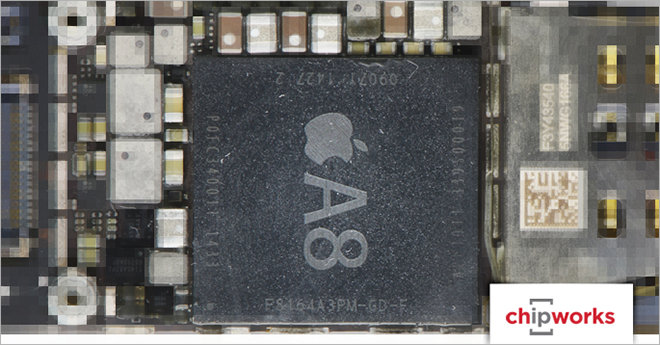According to one of Apple's closest partners, the company's choice to award production contracts for its forthcoming "A9" chip to Taiwan Semiconductor Manufacturing Co. — rather than single-sourcing parts from Samsung — was the result of a concerted lobbying effort from fellow Taiwanese firms.
Foxconn boss Terry Guo said he pushed Apple to choose TSMC because Taiwanese companies must stick together against the "Korean Wave," according to UDN. The report was first noted by GforGames.
While the exact fabrication arrangement for the A9 is unknown, TSMC is thought to have won as much as 30 percent of the orders. Splitting A9 production between TSMC and Samsung is said to have been a "last-minute decision" on Apple's part.
As the CEO of Foxconn, Guo is one of Apple's closest allies and likely holds significant sway with Apple executives. Foxconn is responsible for the manufacturing and assembly of the lion's share of Apple products, helping Apple's operations team manage the company's staggering growth.
Samsung, meanwhile, maintains a somewhat testy relationship with Apple. The companies compete fiercely in smartphones and tablets, and while Samsung's foundry unit operates independently from its consumer electronics business, that animosity is believed to have soured both relationships.
 AppleInsider Staff
AppleInsider Staff








 Marko Zivkovic
Marko Zivkovic
 Christine McKee
Christine McKee
 Andrew Orr
Andrew Orr
 Andrew O'Hara
Andrew O'Hara
 William Gallagher
William Gallagher

 Mike Wuerthele
Mike Wuerthele
 Bon Adamson
Bon Adamson



-m.jpg)



33 Comments
Again, no matter what Ming Chi says, you can not make the same SOC on two difference processes. Apple will choose one or the other, not both.
I can't believe that the author of this piece wrote, with a straight face, "...Samsung's foundry unit operates independently from its consumer electronics business..." In these Korean style vertically integrated conglomerates there is no such thing as "operating independently" when it comes to the sharing of information across divisions, and sharing the same anti-competitive and immoral culture.
Again, no matter what Ming Chi says, you can not make the same SOC on two difference processes. Apple will choose one or the other, not both.
It wouldn't be necessary to have the same SOC. There are at least 4 different products that could take variations; iPad Air, iPad Mini, iPhone 6s, iPhone 6+.
Apple is in a position to afford to do two different processes if they wish, and risk reduction would be one of the reasons that I believe that both TSMC and Samsung/GF might be involved in A9 production. But, all rumors at this point.
Court papers have proven that Samsung does in fact cross lines and Samsung publicly stating it will shield its subsidiaries from other divisions as a result proved they were doing it. Samsung has zero cred.
Not sure what to make of the TSMC quote about it pushing Apple to choose them. Apple doesn't get "pushed" by anyone. It does the pushing. Sounds more like them doing a self-patting on the back.
The production split decision might have been last minute, but designing the A9 for TSMC's 16FF would have been in process for many months, just in case Apple needed/wanted to use TSMC alongside/insteadof Samsung. You can't just take a chip designed for one process and use that design on a different process. If Apple hasn't dual-designed the A9 for both processes, then only one process will be used. As for the paranoid worriers about Samsung - Samsung would not gain a lot, if anything, from seeing Apple silicon being made in their fabs - they might get an idea of how many cores/GPUs Apple is including on their next generation chip, but that's fat use when it takes a year to take a chip from conception to implementation.